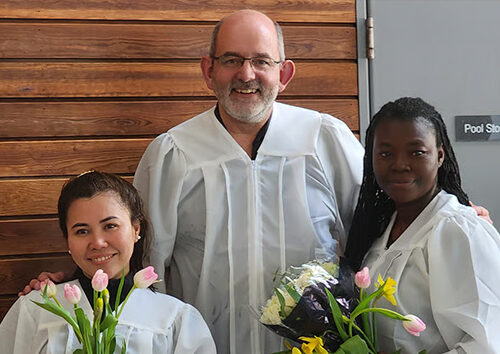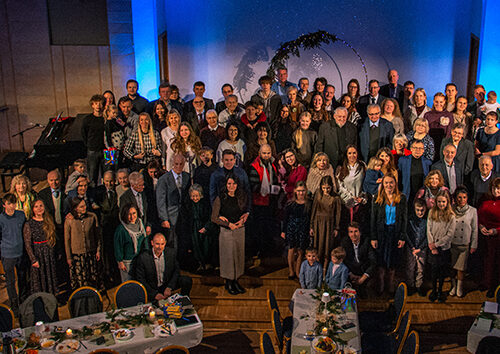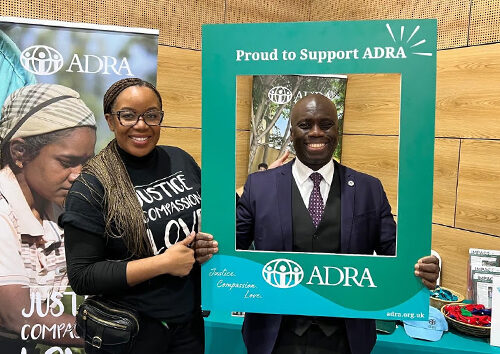12 November 2018 | Binfied, UK [Helen Pearson]
Nick Harborne, Director of the Refugee Support Group in Reading (RRSG), the nearest large town to Newbold College, offered the audience attending the Tuesday, 6 November Diversity lecture an insight into the seriousness of the refugee situation on their doorstep.
![[Photo credit: Asun Olivan] Diversity Lecture Nov 2018 3](https://ted.adventist.org/sitenews/wp-content/uploads/2018/11/images_news-2018_Diversity_Lecture_Nov_2018-3.jpg) The world’s refugees have been processing across our television screens for some years now. Wars in Kosovo, Afghanistan, the Sudan, Ukraine, the Yemen and Syria have intensified the situation. In 2018, Mr Harborne told us, there are 68 million refugees in the world – people who, according to the UN definition, have been ‘forced to flee their country because of persecution, war or violence’. He recognised that many people ask, ‘Why don’t the neighbouring countries take care of refugees?’ In response he noted that 25% of the population of Lebanon is now comprised of refugees. There are a further two million in Iraq, Turkey and other nearby countries.
The world’s refugees have been processing across our television screens for some years now. Wars in Kosovo, Afghanistan, the Sudan, Ukraine, the Yemen and Syria have intensified the situation. In 2018, Mr Harborne told us, there are 68 million refugees in the world – people who, according to the UN definition, have been ‘forced to flee their country because of persecution, war or violence’. He recognised that many people ask, ‘Why don’t the neighbouring countries take care of refugees?’ In response he noted that 25% of the population of Lebanon is now comprised of refugees. There are a further two million in Iraq, Turkey and other nearby countries.
In 2014, the British government agreed to take 20,000 refugees from Syria over a 5-year period. What happens to them as they try to rebuild their lives in a new, alien environment? Harborne considered what the chances were of us building community with them and other traumatized people with little or no governmental recognition as they arrive here in the UK and on our Berkshire doorstep?
Harborne drew pictures of the various challenges, both personal and bureaucratic, faced by refugees when it comes to living in a new country, let alone integrating into it. A history of domestic violence and mental health problems, chronic illness and disability are all intensified by the difficulty of speaking English.
People originally from the refugee’s own country, now UK citizens, may offer limited help but they may also be struggling to cope with their own challenges. All this is exacerbated by what seems to be an inhumane lack of response of an understaffed, overwhelmed and unresponsive Home Office. Harborne pointed out that all these experiences happen in a society where the CEO of Amazon earns £28,000 in 10 seconds – enough to support a legal caseworker in RRSG for a year. At the same time, local authority grants to voluntary organisations are regularly diminishing.
Harborne quoted Mahatma Gandhi: A nation’s greatness is measured by how it treats its weakest members. And he asked thought-provoking questions: Should we boycott large companies like Amazon and Nestlé? Can we make large companies change their ways and pay tax? What can we do about the bubble of privilege in which many of us live? “We know what is going on but we back away believing that there are others out there who will deal with it,” he said. People will have different responses. The important thing is not to ‘just stand by’ but offer our individual response.
 Harborne finished with a message of hope describing community attempts not to just ‘stand by’. Reading and one hundred and fifty other towns and cities in the UK and Ireland have started their own ‘City of Sanctuary’ movement. Community organisations have got together to create a network of towns and cities who will seek to provide places where they will find a welcome. They are creating opportunities for refugees to tell their stories, to get scholarships for continuing education, to develop coffee bank centres where refugees can learn English and get help with bureaucratic form-filling. Local coffee-drinkers can pay twice for their coffee and leave a free cup in the ‘bank’ to be claimed by refugees.
Harborne finished with a message of hope describing community attempts not to just ‘stand by’. Reading and one hundred and fifty other towns and cities in the UK and Ireland have started their own ‘City of Sanctuary’ movement. Community organisations have got together to create a network of towns and cities who will seek to provide places where they will find a welcome. They are creating opportunities for refugees to tell their stories, to get scholarships for continuing education, to develop coffee bank centres where refugees can learn English and get help with bureaucratic form-filling. Local coffee-drinkers can pay twice for their coffee and leave a free cup in the ‘bank’ to be claimed by refugees.
In the lecture and the Q&A session which followed, Harborne described the clear majority of displaced people who just want to get away from bureaucracy and get on with their lives. Some of them are professional people who have no access to evidence of their qualifications in their own countries, others need a bit of help with a variety of practical issues.
Various members of the audience offered skills to contribute to the work. Although the word ‘refugee’ does not appear directly in the Bible, a group of Christians had been reminded once again of the importance of caring for strangers.
The recording of the lecture can be seen on the Newbold College of Higher Education Facebook page.
tedNEWS Staff: Victor Hulbert, editor; Sajitha Forde-Ralph, associate editor
119 St Peter’s Street, St Albans, Herts, AL1 3EY, England
E-mail: [email protected]
Website: www.ted.adventist.org
tedNEWS is an information bulletin issued by the communication department of the Seventh-day Adventist Church in the Trans-European Division. Readers are free to republish or share this article with appropriate credit including an active hyperlink to the original article.



